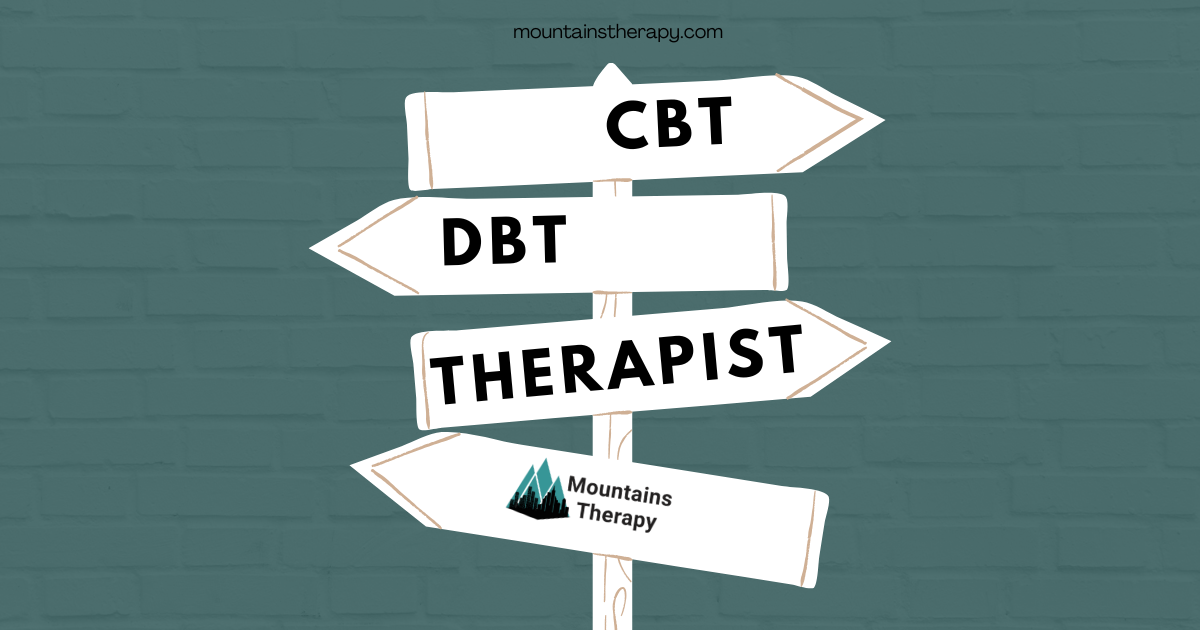Understanding Cognitive Behavioral Therapy (CBT) and Dialectical Behavior Therapy (DBT): Finding the Best Therapist Near You
Learn more about CBT Therapy and DBT Therapy here.
When it comes to mental health care, finding the best CBT therapist near me or the best DBT therapist near me can make all the difference. Whether you're seeking therapy for anxiety, emotional regulation, or relationship challenges, understanding how Cognitive Behavioral Therapy (CBT) and Dialectical Behavior Therapy (DBT) work can help you choose the right path for your needs.
What Are CBT and DBT?
CBT and DBT are structured, evidence-based therapies tailored to help clients overcome emotional and behavioral challenges.
- Cognitive Behavioral Therapy (CBT) is focused on identifying and restructuring negative thought patterns that lead to unhelpful behaviors. If you're looking for a CBT counselor, this therapy is ideal for addressing anxiety, depression, and other common mental health concerns.
- Dialectical Behavior Therapy (DBT) builds on CBT principles while incorporating strategies for mindfulness, distress tolerance, and interpersonal effectiveness. If emotional regulation is a key concern, working with a DBT counselor might be the best fit.
What to Look for in a CBT or DBT Therapist
Finding the best CBT therapist near me or the best DBT therapist near me involves evaluating a therapist’s experience, approach, and specialization. Here are some tips:
- Look for therapists who are certified or extensively trained in CBT and DBT techniques.
- Ask about their experience working with clients facing similar challenges.
- Consider their approach to therapy—do they offer personalized plans tailored to your unique needs?
How Are CBT and DBT Similar and Different?
Clients often wonder, "Are CBT and DBT similar?" or "How does CBT differ from DBT?" Here’s a quick comparison:
- Both CBT and DBT help clients build skills for coping with stress and emotional challenges.
- CBT focuses more on restructuring negative thought patterns, while DBT emphasizes emotional regulation and balancing acceptance with change.
What Issues Does Cognitive Behavioral Therapy (CBT) Help With?
Cognitive Behavioral Therapy (CBT) is a versatile and evidence-based approach that targets negative thought patterns and behaviors. It’s highly effective for addressing the following issues:
- Anxiety Disorders:
- Generalized anxiety disorder (GAD)
- Panic disorder
- Social anxiety disorder
- Phobias
- Mood Disorders:
- Depression
- Bipolar disorder
- Trauma and Stress:
- Post-traumatic stress disorder (PTSD)
- Stress management
- Obsessive-Compulsive Disorders:
- Obsessive-compulsive disorder (OCD)
- Body dysmorphic disorder
- Eating Disorders:
- Anorexia nervosa
- Bulimia nervosa
- Binge eating disorder
- Addictions:
- Substance use disorders
- Behavioral addictions (e.g., gambling)
- Other Issues:
- Chronic pain management
- Insomnia
- Low self-esteem
- Relationship challenges
- Procrastination and time management difficulties
What Issues Does Dialectical Behavior Therapy (DBT) Help With?
Dialectical Behavior Therapy (DBT) is a structured, skills-focused therapy originally designed for emotional regulation and interpersonal effectiveness. It is particularly helpful for:
- Emotional Dysregulation:
- Intense mood swings
- Difficulty managing emotions
- Borderline Personality Disorder (BPD):
- A primary treatment modality for BPD
- Self-Harming Behaviors and Suicidality:
- Managing thoughts and behaviors related to self-harm
- Reducing suicidal ideation
- Interpersonal Challenges:
- Improving relationships
- Setting boundaries
- Impulsive Behaviors:
- Risky or self-destructive actions
- Difficulty with impulse control
- Trauma and PTSD:
- Addressing symptoms of complex trauma
- Eating Disorders:
- Emotional eating or other disordered eating patterns
- Substance Use Disorders:
- Especially in cases involving emotional triggers
- Other Issues:
- Chronic feelings of emptiness
- Anger management
- Difficulty tolerating distress
- Overwhelming stress
CBT vs. DBT: Choosing the Right Approach
Depending on your needs, these therapies can be used individually or in combination to provide comprehensive support.
- CBT is best for addressing specific, unhelpful thought patterns and behaviors in conditions like anxiety, depression, OCD, or insomnia.
- DBT is ideal for individuals who struggle with intense emotions, impulsivity, or relationship challenges, particularly in cases of borderline personality disorder or emotional dysregulation.
Can CBT and DBT Be Used Together?
Yes! Many clients ask, "Can you do both CBT and DBT?" or "Can you do DBT and CBT at the same time?" The answer is a yes. Combining CBT and DBT techniques can offer a comprehensive approach to mental health care.
For example:
- CBT techniques can help you identify and challenge unhelpful thoughts.
- DBT strategies can teach you to manage intense emotions and improve relationships.
Why Choose Mountains Therapy for CBT and DBT Counseling?
At Mountains Therapy in Montclair, NJ, we specialize in Cognitive Behavioral Therapy (CBT) and Dialectical Behavior Therapy (DBT). Whether you're searching for the best CBT therapist near me, the best DBT therapist near me, or a skilled CBT counselor or DBT counselor, our team is here to support you. We tailor our therapeutic approaches to meet your unique needs, helping you build resilience, improve emotional well-being, and achieve your goals. If you’re looking for expert CBT or DBT therapy near or in Montclair, NJ, contact us today. Let us help you find the balance, connection, and growth you deserve.














